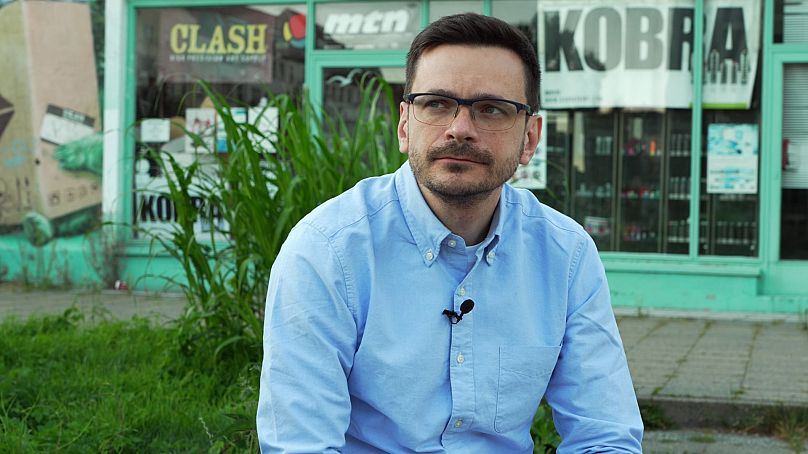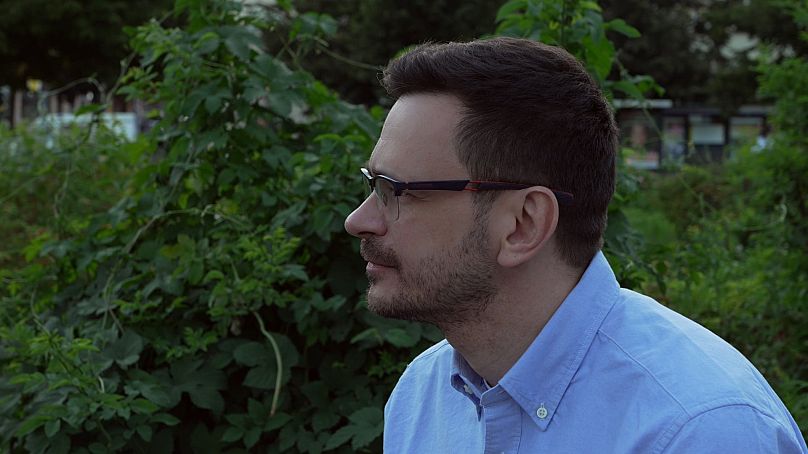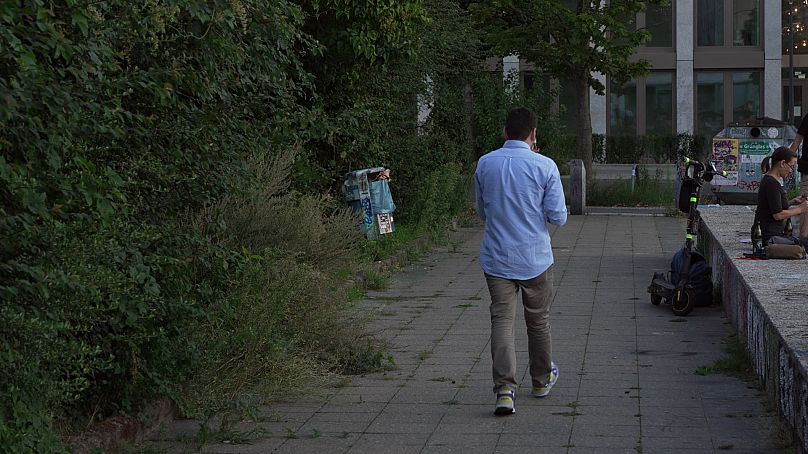Kremlin opponent Ilya Yashin, who was recently released in a massive prisoner exchange, spoke to Euronews about his time in Russian prison and told us what will bring Putin down.
Russian opposition activist Ilya Yashin was released on 1 August after two and a half years in a Russian prison thanks to a prisoner exchange between Russia and Western countries.
 ADVERTISEMENT
ADVERTISEMENT
 ADVERTISEMENT
ADVERTISEMENT
He spoke to Euronews in Berlin about Russia, his time behind bars, and his plans now that he is free again.
"It's very important to keep yourself in a good emotional and physical state because otherwise you just collapse," said Yashin, as we sit on a graffiti-painted concrete slab in a Berlin park. "Besides, two years is not a critical period," he added.
"They say that such irreversible changes only occur after three years behind bars. After that, people develop serious health problems: their teeth fall out, their hair falls out."
Yashin was well prepared for his prison sentence
Yashin knew he would be arrested if he did not leave the country, and he was quite well prepared for prison, he told Euronews.
In an interview in 2022, he told Russian video blogger Yuri Dud ("wDud") that he had already had his teeth done by a dentist in preparation for prison.
"I was probably lucky in many ways, because I got a lot of support and there were a lot of letters," Yashin said about the support he received.
"I knew that a lot of people were worried about me. Of course, that gave me strength and the will to live and somehow inspired and motivated me to take care of myself."
Yashin had a stroke of luck. After he was sentenced to eight and a half years in prison for disobeying the Russian armed forces on 9 December 2022, he occasionally spent time in solitary confinement in the so-called PKT punishment block in his prison in Smolensk in western Russia, but generally served his sentence in the general prison system.
Being transferred to a PKT cell is considered the highest disciplinary punishment in Russian prisons. Prisoners are completely isolated from other inmates and the rest of the facility and cannot move around freely, visit the library or go to church to pray.
"There are special blocks like this where people are even more isolated, so they don't have mobile phones or other privileges that can be smuggled into prison," said Yashin, describing his solitary confinement.
Russian President Vladimir Putin's biggest opponent and probably Russia's most prominent opposition figure, Alexei Navalny, was held in such a punishment block until he died under dubious circumstances on 16 February in the "Polar Wolf", one of Russia's harshest penal colonies in the Yamalo-Nenets region of Siberia.
'Prisoners and prison guards had respect'
Yashin admits that he was simply lucky compared to many other political prisoners in Russia. He was not tortured or mistreated, he said.
"On the whole, I was even sometimes met with sympathy from the staff (of the prison). It seems to me that the rigid instructions to isolate me and create unbearable conditions for me were often even sabotaged at the level of the executors."
"Because everyone understood that I was not a criminal. And the normal employees understood very well that I was not in prison for any criminal offence. I hadn't killed anyone or raped anyone," Yashing explained.
"I was there because of my views, because of my words, because of what I believe in. And that commanded respect from the inmates and even the staff."
"Overall, however, political prisoners are treated differently," he said, eyebrows drawn together. Looking thoughtfully to the side, he seemed suddenly concerned.
"Of course, I'm most worried about Alexei Gorinov. Because this is my comrade, this is a man who, it seems to me, was imprisoned to intimidate me, to drive me out of the country. I'm already free, he's still in prison, and he's an old man, he's 63 years old, and he has quite serious health problems."
The Russian opposition politician — who is missing a part of his lung — Gorinov was sentenced to seven years in prison on 8 July 2022 because he suggested holding a minute's silence for the children killed in Ukraine during a meeting at the Krasnoselsky District Council of Deputies in Moscow.
Yashin now wants to do everything he can to get him out of prison.
Political prisoners in Belarus have it worse
Yashin also believes standing up for Belarusian opposition activists in prison remains important. In the prisoner exchange program, not a single political prisoner from Belarus was released.
The way Belarusian politicians are put under pressure is even worse. "They are under much more pressure than we are," he said. Lawyers have not been able to reach people there for years.
"We didn't know what's going on with Sergei Tikhanovsky for almost two years. We don't know what's going on with Maria Kalesnikava. They were tortured and abused for almost two years. We don't know whether they are still alive at all."
"And, of course, I think it's right to establish some kind of joint work with the Belarusian opposition, at least in terms of supporting political prisoners," Yashin explained.
Belarusian video blogger Tikhanovsky was sentenced to 18 years in prison in December 2021 for an unauthorised rally.
The Belarusian civil rights activist and opposition politician Maria Kalesnikava, a face of the democracy movement in Belarus, was sentenced to 11 years in prison.
Using YouTube against Putin
In addition to freeing political prisoners, Yashin wants to focus on his work in anti-war education. Yashin has a YouTube channel with over 1.6 million followers.
There, he tries to inform Russian citizens about the Kremlin's war crimes, including the massacre in Bucha, a suburb of Kyiv. Russian forces are accused of brutally executing civilians there during the battle for Kiyv in the spring of 2022.
After the withdrawal of the Russian military, a total of 458 bodies were found there. 419 of them bore signs of torture.
According to Yashin, the fact that he spoke out about this was the formal reason for his arrest. But his imprisonment did not stop him from telling the truth. He found a way to continue posting on his YouTube channel from prison despite strict censorship.
"Well, you could communicate with others by exchanging letters. And sometimes the censors let things through," said Yashin.
"Of course there were times when my texts were blocked or something was crossed out. But still, when there is a huge amount of letters, and I had a huge amount of letters. I received more than 30,000 letters and postcards in the two years I was imprisoned. And the censors couldn't handle it. And things often got through," he recalled.
"So I was able to pass on some information in my letters. Information of public importance that I wanted to publish on my social networks or asked my team to turn into a video on YouTube."
Yashin said opposition channels have dramatically gained in popularity over the last two years.
"People who were used to getting information via television after the war began have realised that television as it now exists in Russia does not satisfy people's need for information. It is pure propaganda. So, people began to look for alternative sources of information, alternative opinions, to understand what was going on in reality."
Is support for Putin really that big?
While Putin has a certain amount of support he can count on, more and more people in Russia are sceptical, Yashin said.
"I don't think there are that many people who support Putin ideologically and would be prepared to follow him unconditionally," explained Yashin.
"There are about as many supporters of Putin as opponents of Putin. Russian society is largely made up of people who espouse a wait-and-see attitude," he said. "The economic situation and the social situation in Russian society are deteriorating. And people, it seems to me, are seeing it more and more. They associate it with Putin's policies."
"Incidentally, the (Wagner leader Yevgeny) Prigozhin's uprising last summer was a genuine rebellion, despite Putin's hysterical reaction. Society reacted rather indifferently to it. There were no rallies in favour of Putin."
People in Russia are currently unable to express their opinions openly. Civil resistance in Russia is only possible underground, said Yashin, "because any open criticism of the authorities, any statement against the war, basically means criminalisation."
Putin's power is rooted in "propaganda, manipulation and, of course, the use of force", Yashin explained.
Yet, there are more and more dissatisfied people in Russia who are prepared to take action. "If there is a way to express their protest legally, these people will undoubtedly use this opportunity," Yashin is convinced.













